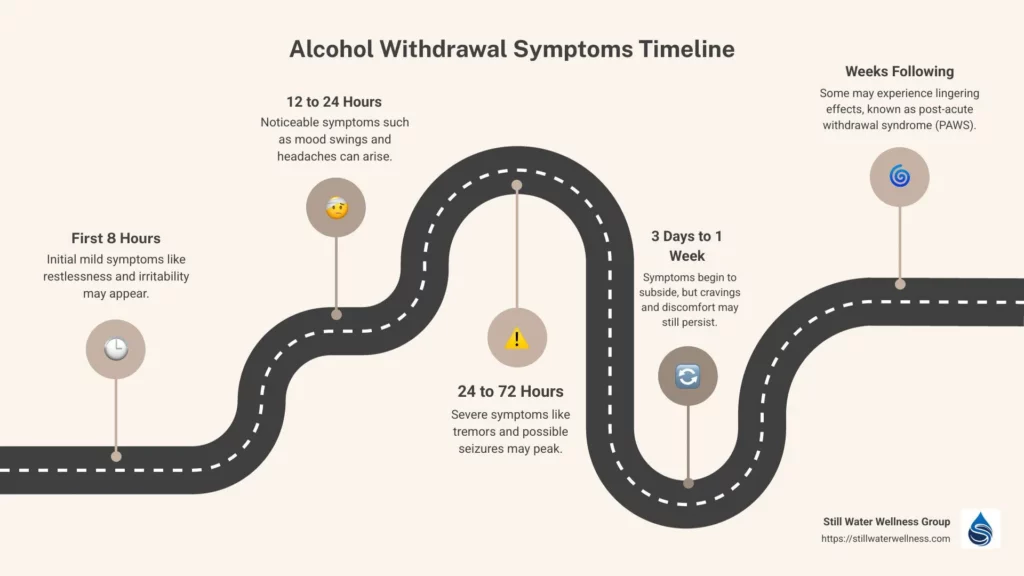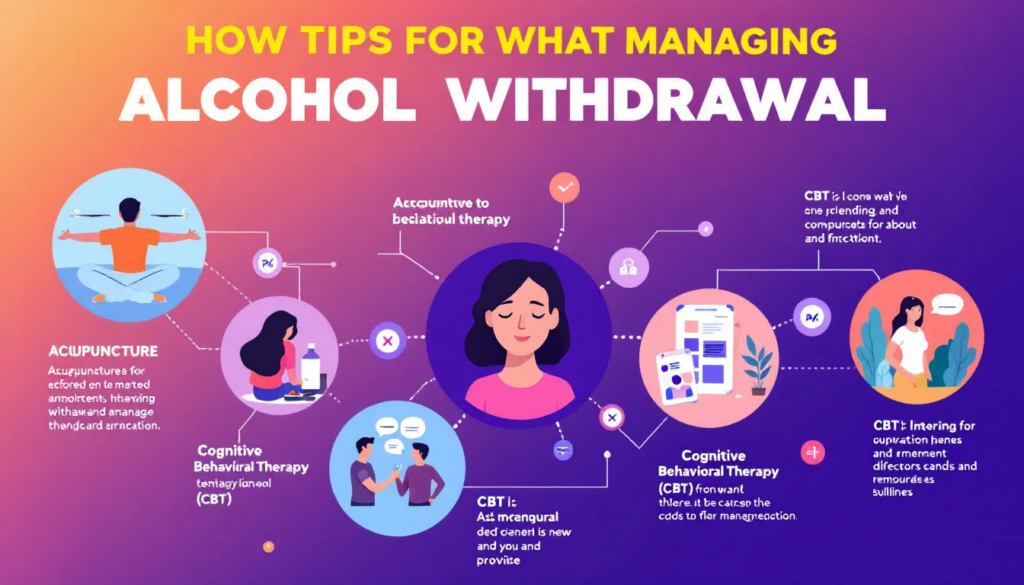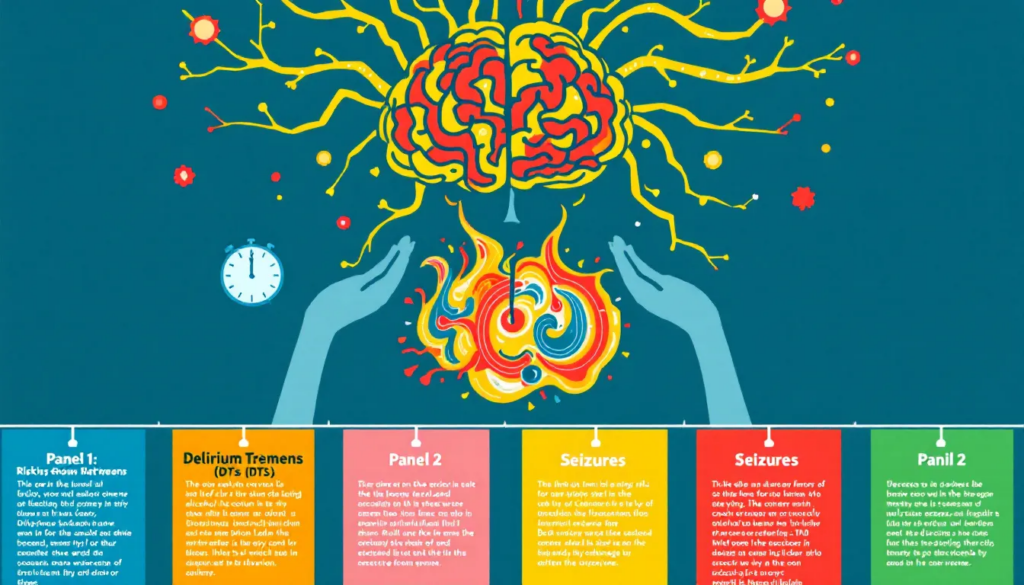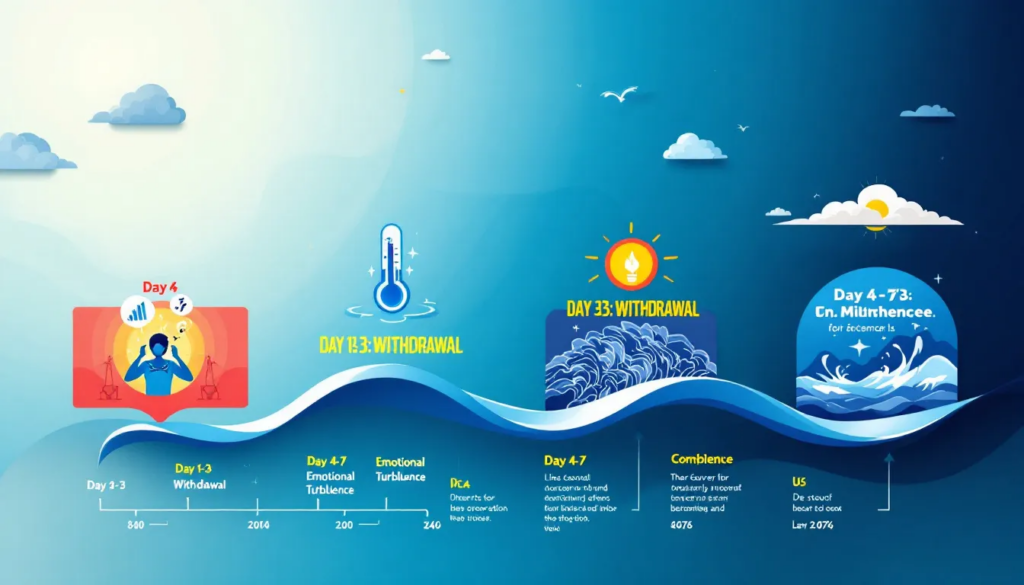When you stop drinking, your body begins a process of alcohol withdrawal that unfolds over time. Understanding the alcohol withdrawal timeline is crucial for anticipating symptoms and seeking appropriate care. This guide will walk you through the different phases and what to expect at each stage.
Key Takeaways
- Alcohol withdrawal symptoms can begin just hours after the last drink, with early recognition and medical attention being crucial for effective management and to prevent severe complications.
- The severity and progression of withdrawal symptoms vary based on individual factors such as alcohol dependence, medical history, and concurrent substance use, highlighting the need for tailored treatment plans.
- Comprehensive management of alcohol withdrawal includes medical treatment, behavioral therapies, and strong support systems, essential for ensuring a successful recovery and long-term sobriety.
The Onset of Alcohol Withdrawal

The commencement of alcohol withdrawal symptoms often starts a mere few hours following one’s last consumption of alcohol. Factors such as an individual’s age, gender, genetic predisposition, and history with alcohol can influence when these symptoms begin to manifest. Those who drink heavily—specifically men who have 15 or more drinks each week and women who consume eight or more—are at a heightened risk for experiencing withdrawal symptoms from alcohol. Those who engage in daily drinking habits stand a greater chance of undergoing withdrawal.
It is crucial to identify the signs of alcohol withdrawal early on so that appropriate medical assistance can be obtained swiftly. Symptoms may range from mild anxiety and shaking to serious complications which underline the urgency for immediate medical attention. Timely recognition of the first indicators coupled with seeking professional aid is instrumental in effectively navigating through the process of managing withdrawals safely.
Early Symptoms
Initial symptoms of alcohol withdrawal typically emerge about six hours following the consumption of the last alcoholic beverage. These onset symptoms tend to be mild and may encompass slight tremors, a sense of mild anxiety, as well as minor alcohol withdrawal indications such as headaches. During this period when the body begins adapting to not having alcohol, these severe signs linked with alcohol withdrawal can progressively become more intense.
Although at first these signs might seem tolerable, there’s potential for them to intensify rapidly without adequate intervention. Even subtle withdrawal indicators could foreshadow deeper problems. Thus highlighting the critical nature of obtaining early medical assistance. Vigilant observation of these symptoms is key in preventing Health complications and facilitating a more controlled experience throughout the detoxification process.
Initial Medical Attention
During the initial phase of withdrawing from alcohol, it is crucial to have medical supervision. Those who consume large amounts of alcohol must obtain immediate medical attention for their own well-being. Withdrawal symptoms are managed by healthcare experts who give guidance and care to mitigate dangers.
In the course of detoxification, constant surveillance is conducted on vital signs while handling possible issues that may arise. This continuous vigilance allows for quick intervention in case severe symptoms develop, thereby safeguarding the patient’s health and security. Detox facilities typically offer extensive medical services dedicated to closely monitoring and controlling the effects associated with withdrawal from alcohol.
Progression of Withdrawal Symptoms

The development of alcohol withdrawal symptoms as time progresses from hours into days can differ greatly among individuals. The initial symptoms often persist for a period ranging between 4 to 48 hours, and in the absence of professional intervention, some people may quickly move from experiencing moderate levels to facing severe symptoms. The simultaneous use of other substances might intensify the withdrawal process and amplify its associated symptoms.
Understanding the timeline for alcohol withdrawal is beneficial for setting realistic expectations and arranging suitable care strategies. This progression consists of various phases, each characterized by unique challenges and particular symptoms that manifest at different times following one’s last consumption of alcohol.
12 to 24 Hours After Last Drink
Individuals may start to encounter various withdrawal symptoms between 12 and 24 hours following their final consumption of alcohol, as their body starts responding to the lack of alcohol’s presence. During this initial phase, typical reactions such as nausea and an elevated heart rate can lead to substantial unease and emotional turmoil.
As these early indicators signal the commencement of alcohol withdrawal, they reflect the body’s increased vigilance while it adapts chemically without alcohol. Recognizing that these discomforting signs are a standard component of the withdrawal process can aid both individuals experiencing them and those providing care in handling these manifestations more proficiently.
24 to 72 Hours After Last Drink
During the critical timeframe of 24 to 72 hours following an individual’s final drink, they are likely to encounter the zenith of withdrawal symptoms. The emergence of serious manifestations like hallucinations and seizures demands vigilant medical oversight.
It is essential for individuals undergoing this intense phase to be under strict medical watchfulness, as it helps control the severe withdrawal symptoms and avert perilous outcomes such as delirium. This underscores the importance of having a systematic approach through a medically supervised detoxification process.
Post-72 Hours
Most withdrawal symptoms start to diminish after the 72-hour mark, and this time frame. Sees the more severe symptoms abating. Yet some people might still encounter lingering psychological effects for an extended period lasting several months, a state referred to as post-acute withdrawal syndrome (PAWS).
Even though physical signs of withdrawal tend to wane within a short span of days, the mental ramifications may endure much longer. It’s crucial to acknowledge that recovery is often protracted and necessitates consistent support and therapy. This awareness helps individuals prepare themselves for an enduring recuperative journey while guaranteeing sustained assistance is available.
Factors Influencing Withdrawal Severity
The intensity of withdrawal symptoms from alcohol can differ widely based on a range of personal characteristics. When people with an alcohol use disorder cease or considerably decrease their consumption, about half will experience withdrawal symptoms. The timeline for when these symptoms begin to manifest may also be different for each individual and is affected by the extent of their dependence on alcohol, their medical background, and whether they are using other substances at the same time.
Recognizing these influential factors is critical in customizing appropriate care and assistance. Understanding what contributes to differences in how individuals undergo withdrawals assists in overseeing the withdrawal phase with greater efficiency and safety.
Level of Alcohol Dependence
The intensity of withdrawal symptoms is greatly influenced by the degree of alcohol dependence. Those who suffer from a pronounced form of alcohol use disorder (AUD) typically struggle with regulating their consumption, even in the face of negative repercussions. The harshness and acuteness of these withdrawal episodes are contingent upon how much and for how long one has been consuming alcohol.
To evaluate the severity level experienced during withdrawal, measurement tools such as the Clinical Institute Withdrawal Assessment (CIWA) scale are utilized. On this scale, scores ranging from 10 to 18 signify moderate to severe levels of withdrawal. Conversely, scores exceeding 18 denote an elevated danger for serious complications without proper intervention.
By using these evaluations, medical professionals can determine what kind of treatment is necessary throughout the process of withdrawing from alcohol use.
Medical History and Co-occurring Disorders
The severity of alcohol withdrawal symptoms can be greatly affected by existing medical conditions and simultaneous mental health issues. Individuals with a background in mental health disorders tend to have an increased likelihood of experiencing severe withdrawal symptoms during alcohol withdrawal.
Recognizing these potential risks is essential in delivering customized care and support for those undergoing the process of withdrawing from alcohol.
Polysubstance Use
Engaging in the consumption of various substances can exacerbate the severity of symptoms experienced during alcohol withdrawal. This simultaneous usage heightens not only the intensity of severe withdrawal symptoms, but also amplifies the likelihood of dangerous complications, including seizures.
It is vital to acknowledge how polysubstance use influences alcohol withdrawal to ensure that management strategies for withdrawing are both secure and successful.
Managing Alcohol Withdrawal

Effectively managing alcohol withdrawal necessitates an integrated approach that encompasses medical intervention, therapeutic strategies, and robust support systems. It is vital for individuals grappling with the regulation of their alcohol intake to pursue professional assistance. Facilities such as Paramount Recovery Centers are dedicated to providing holistic treatment aimed at addressing both addiction issues and concurrent mental health conditions.
To craft a personalized treatment regimen that addresses all dimensions of withdrawal and rehabilitation, conducting a comprehensive assessment of an individual’s physical and psychological well-being is essential. This part will delve into various methods for handling withdrawal symptoms to facilitate a seamless transition through recovery.
Medications for Symptom Relief
Pharmaceutical interventions play a crucial role in the control of withdrawal symptoms. Drugs such as diazepam and chlordiazepoxide, which fall under the benzodiazepines category, are frequently used because they diminish seizure risks and exert a calming effect similar to that of ethanol. The administration of these medications is guided by the intensity of withdrawal signs, determined using assessment instruments like the CIWA scale.
In managing benzodiazepine treatment, it’s common practice to gradually reduce doses over 7 to 10 days once withdrawal symptoms have been stabilized. Alternative medications like lorazepam or oxazepam may be preferred for individuals who are elderly or suffering from liver impairments. Such meticulous management is vital for ensuring both safety and ease throughout the process of withdrawal.
Behavioral Treatments
Behavioral therapies play a crucial role in assisting people to cease alcohol consumption and sustain abstinence. Such treatments are offered in group as well as one-on-one environments, offering vital backing and techniques for coping. Continuing with therapeutic sessions is critical for preserving abstinence post-detoxification while also managing any arising psychological symptoms.
Support Networks
Having a robust support system is essential for successful recovery. These networks of support offer both emotional and practical help, which in turn bolsters the results of the recovery process. Being actively involved in support groups markedly boosts one’s prospects for enduring sobriety as well as their general wellness.
Risks and Complications

The process of withdrawing from alcohol carries substantial dangers, including potentially life-threatening conditions. It is crucial that individuals undergo medical supervision to observe their vital signs and handle any arising complications. Failure to promptly identify and address alcohol withdrawal syndrome may result in grave consequences like seizures or the onset of depression.
Medical professionals are integral in addressing symptoms as they emerge and equipping patients for a positive outcome during the withdrawal period. Acknowledging these hazards is key to securing a safe and successful detoxification from alcohol.
Delirium Tremens
Delirium tremens, often referred to as DTs, represent some of the most extreme withdrawal symptoms a person can experience, marked by confusion and changes in mental state. The death rate for those suffering from DTs lies between 1% and 4%, but without timely treatment, up to 15% of these episodes could result in fatality.
The likelihood of encountering delirium is particularly heightened among older alcohol consumers with substantial intake histories. This susceptibility increases even more for individuals who have impaired liver function or have previously undergone severe withdrawal symptoms. It’s imperative to seek medical attention immediately if indications of delirium manifest since the condition can deteriorate rapidly.
Seizure Risk
The potential for seizures during alcohol withdrawal presents a significant danger. Should an individual cease consuming alcohol abruptly, they may experience these withdrawal seizures, which have the capacity to be life-threatening without swift management. It is critical to obtain immediate medical attention if such seizures manifest.
During detoxification, consistent monitoring of an individual’s vital signs is essential as it assists in the early detection of complications. This practice helps guarantee prompt intervention and aids in reducing associated risks.
Long-term Health Impacts
The health consequences of alcohol withdrawal from sustained use can be both deep and complex. Those who have experienced withdrawal from alcohol may encounter heightened levels of anxiety, depression, and various mood-related disorders. Even when the immediate symptoms of withdrawal cease to exist, physical ailments such as damage to the liver and cardiovascular complications can continue.
Extended use of alcohol followed by its cessation can result in nutritional deficits that compromise general health and increase the likelihood for continued consumption or abuse of alcohol.
Timeline for Recovery

Individuals experience a wide range of recovery timelines when it comes to alcohol withdrawal, with the duration of symptoms varying significantly from person to person. Typically, these withdrawal symptoms start to diminish after about one week. The initial weeks are crucial due to the heightened risk for relapse at this time. Even after the initial phase has passed, an individual may continue to grapple with psychological issues like anxiety and depression for several weeks or months – a phenomenon referred to as post-acute withdrawal syndrome (PAWS).
We will outline each step in the recovery journey from alcohol withdrawal over time in this section—from day one through beyond a month—underscoring both expected struggles and progress during each part of this timeline. Understanding what lies ahead not only helps set appropriate expectations, but also equips individuals with the insight necessary for achieving successful long-term sobriety.
First Week
Typically, alcohol withdrawal symptoms persist for approximately 4.83 days within the first week of cessation and usually subside by the week’s end. After merely one week of abstaining from alcohol, numerous individuals report significant enhancements like enhanced mental clarity and a decrease in mental fogginess.
Early positive changes can serve as an inspiration and offer necessary encouragement to maintain progress towards recovery.
Weeks Two to Four
During the second to fourth week, people will typically observe notable enhancements in their health. This includes experiencing improved sleep quality, diminished sensations of depression and anxiety, as well as an increase in general wellness. During this timeframe, the gut starts recovering, which results in decreased bloating and fewer gastrointestinal problems. The betterment of overall health is also aided by improved hydration.
This stage represents a critical time for adaptation and achieving stability within one’s system.
Beyond One Month
After the first month of sobriety, its advantages become increasingly evident. With appropriate treatment and support, full recovery from alcohol withdrawal can be achieved. Nevertheless, as individuals begin to experience improvements in their well-being, there might be a renewed urge to drink. This underscores the necessity for continued assistance and the use of non-habit-forming medications to uphold abstinence.
Persistent symptoms that may endure anywhere between six months and two years following the initial withdrawal phase are indicative of post-acute withdrawal syndrome. This condition underlines the critical nature of sustained care and support over an extended period.
How to Safely Quit Drinking
Embarking on the journey to quit alcohol necessitates strategic preparation and expert assistance. It’s imperative for individuals who struggle with regulating their alcohol consumption or suffer adverse effects due to alcohol addiction to obtain professional guidance when deciding to stop drinking.
A medically supervised detox offers round-the-clock observation, allowing for the identification and management of any issues that may arise during withdrawal from alcohol, thereby enhancing comfort levels throughout this phase. In this segment, we’ll walk you through how to get ready for detoxification, what your experience might entail while undergoing it, and why care following detox is critical.
Preparing for Detox
Seeking the guidance of medical experts prior to initiating detoxification is crucial for a more comfortable and secure experience. It’s essential that individuals experiencing alcohol withdrawal symptoms enlist professional support as an initial measure. To achieve a fruitful recuperation following detox, it is advised that care be extended for at least 90 days, providing sufficient time for physical adjustment and recovery.
During Detox
Throughout the detoxification period, it’s crucial for individuals to undergo a comprehensive evaluation by medical experts in order to create a customized detox strategy. Such programs are designed to tackle early withdrawal symptoms while offering medical oversight to handle potential issues that may arise. This methodical tactic guarantees that the process of withdrawing is conducted with maximum safety and comfort.
Post-Detox Care
Continued assistance and nurturing are essential for lasting recovery from dependence on alcohol following the initial detox period. Therapy and counseling, which encompass behavioral treatments, provide vital strategies for coping as well as necessary emotional reinforcement.
The presence of a robust support system comprising relatives, friends, and dedicated support circles plays an integral role in preserving abstinence from alcohol use and securing an enduring triumph over addiction.
Paramount Recovery Centers: Your Best Option
Paramount Recovery Centers, situated in Massachusetts, stands as a leading option for those seeking treatment for alcohol withdrawal. The center provides an atmosphere that encourages clients to freely express their apprehensions regarding the journey toward recovery.
Employing an all-encompassing strategy featuring personalized care plans, Paramount Recovery Centers tackles not only the addiction itself but also any concurrent mental health conditions, offering a well-rounded approach to achieving sobriety.
Summary
Alcohol withdrawal is a challenging yet manageable process with the right knowledge and support. From the onset of symptoms to the long-term recovery timeline, understanding what to expect can make a significant difference. Recognizing the importance of professional help, knowing the progression of symptoms, and being aware of the risks and complications are all crucial steps toward a successful recovery.
As you or your loved one embark on this journey, remember that recovery is a marathon, not a sprint. With comprehensive treatment plans, continuous support, and a commitment to sobriety, overcoming alcohol withdrawal is possible. Take the first step today towards a healthier, alcohol-free life.
Frequently Asked Questions
What are the early symptoms of alcohol withdrawal?
Early symptoms of alcohol withdrawal usually begin approximately six hours after the last drink and can include tremors, anxiety, and headaches.
Recognizing these signs early is crucial for effective management.
How long do alcohol withdrawal symptoms last?
Alcohol withdrawal symptoms typically last about one week, with the most intense symptoms occurring in the first 48 to 72 hours.
What factors influence the severity of alcohol withdrawal symptoms?
The intensity of symptoms experienced during alcohol withdrawal is determined by the degree of alcohol dependence, an individual’s medical history, and any additional substance use.
Recognizing these elements is vital for successful treatment and management of alcohol withdrawal.
What medications are used to manage alcohol withdrawal symptoms?
Benzodiazepines such as diazepam and chlordiazepoxide are commonly used to effectively manage alcohol withdrawal symptoms. These medications help alleviate anxiety and agitation associated with withdrawal.
How important is medical supervision during alcohol withdrawal?
It is critical to have medical oversight throughout the process of alcohol withdrawal in order to keep an eye on vital signs, handle any arising complications, and administer proper treatment, all with the goal of protecting your overall health and safety.


